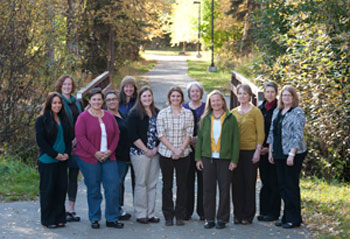Center for Human Development receives $2.5M grant for Alaska LEND Without Walls
by Jamie Gonzales |
 Grant will help train Alaska's future leaders in maternal and child health
Grant will help train Alaska's future leaders in maternal and child health
The UAA Center for Human Development - housed within the College of Health - recently
received a five-year $2.5M grant to establish a Leadership Education in Neurodevelopmental
and Related Disabilities (LEND) program to train Alaska's future leaders in maternal
and child health at the state and national level.
The Alaska LEND Without Walls program will provide distance-delivered graduate-level
interdisciplinary leadership training for individuals with a commitment to providing
family-centered, coordinated systems of health care and related services to improve
the health of infants, children and adolescents who have - or are at risk of developing
- autism and other developmental disabilities. The Alaska program is part of a national
network of 43 LEND programs.
Interdisciplinary leadership training is the hallmark of LEND programs. The program
was developed by UAA faculty from the fields of public health, nursing, speech-language,
psychology, special education, social work and occupational therapy. This interdisciplinary
approach gives trainees exposure to many different fields and experiences.
"Each discipline has its own language," said Karen Ward, director of the UAA Center
for Human Development. "We're trying to expose trainees to the worlds of other disciplines
and help them to see care from a truly integrated approach; not as a collection of
separate assessments and plans, but a comprehensive plan that looks at the needs of
the whole person."
Ward said that one of the program's goals is to help trainees understand family-centered
care - what it's really like to parent and raise a child with a developmental disability.
Trainees will be paired with a host family for two semesters to go to appointments,
be involved in developing individualized education plans and navigating complicated
systems.
The first cohort of 12 trainees starts this fall. The group - made up of professionals
from across Alaska - gathered in Anchorage on Sept. 27-28 to kick off the program
with a two-day orientation. For the didactic segment of the program, trainees will
come together once a week on Fridays for half-day videoconference seminars featuring
case studies, lectures and presentations by health care professionals and faculty
experts.
Alaska LEND Without Walls requires a commitment of 300 hours, which includes 100 hours
of clinical experience in an academic year. The program includes seminars, online
assignments, case conferences, leadership development, clinical skills building, family
experience and rural outreach experiences. Trainees receive a stipend and travel support
to rural neurodevelopmental outreach clinics to fulfill the clinical requirements
of the program.
The program's funding - a total of $2.5M over a five-year period - comes from the
Maternal and Child Health Bureau of the United States Health Resources and Services
Administration. This year's funding is $530,039.
"The LEND programs have a 40-year history," said Ward. "Now that we have established
this program in Alaska we look forward to continued funding well into the future."
For more information about the Alaska LEND Without Walls program, visit the Center for Human Development website or contact Jenny Miller at (907) 786-6588 or jenny.miller@uaa.alaska.edu.
 "Center for Human Development receives $2.5M grant for Alaska LEND Without Walls" is licensed under a Creative Commons Attribution-NonCommercial 4.0 International License.
"Center for Human Development receives $2.5M grant for Alaska LEND Without Walls" is licensed under a Creative Commons Attribution-NonCommercial 4.0 International License.









